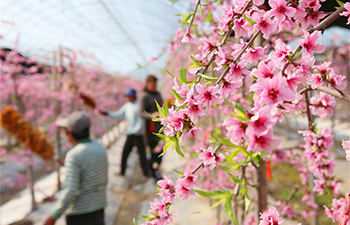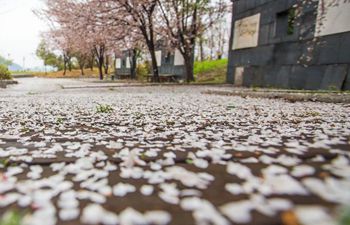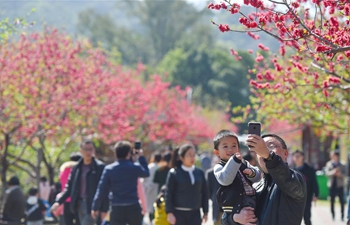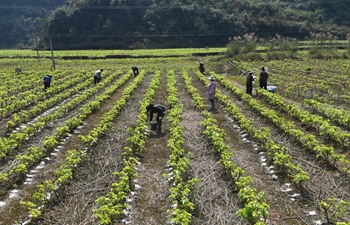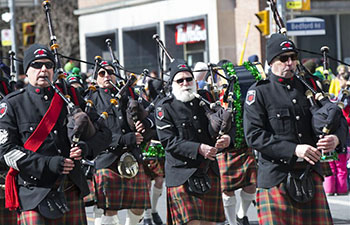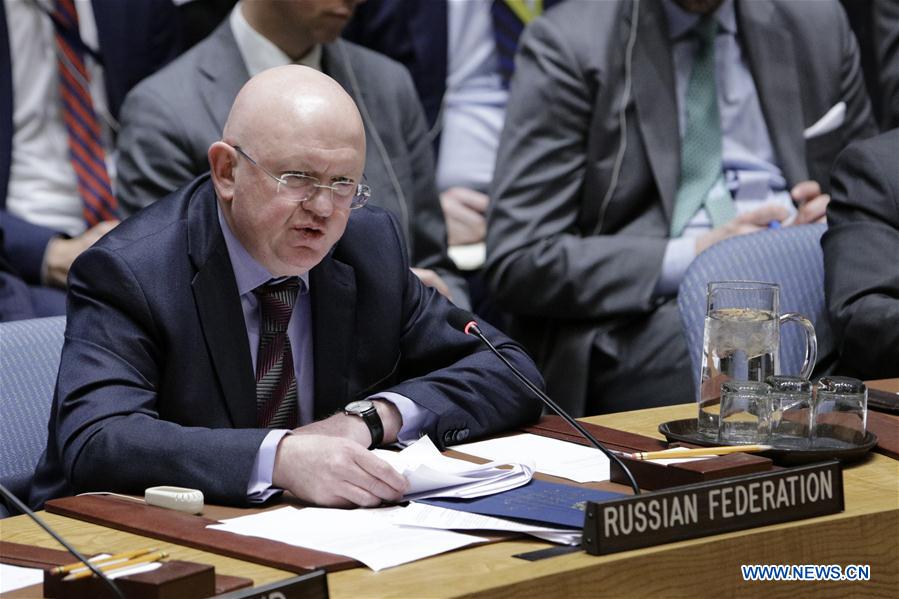
Russian Ambassador to the United Nations Vassily Nebenzia (Front) addresses a Security Council emergency meeting regarding accusations of the use of a nerve agent in the United Kingdom at the United Nations headquarters in New York, on March 14, 2018. Russian Ambassador to the United Nations Vassily Nebenzia said Wednesday that Britain's allegations that Moscow was responsible for a nerve attack were "completely unacceptable." (Xinhua/Li Muzi)
UNITED NATIONS, March 15 (Xinhua) -- In the latest sign of rising tensions between Britain and Russia over the poisoning of a former Russian spy, the two countries' envoys clashed at a UN Security Council emergency meeting convened especially over the matter on Wednesday.
The exchange of barbs came shortly after British Prime Minister Theresa May announced that her government will expel 23 Russian diplomats, cancel high-level bilateral contacts with Russia, and freeze Russia state assets "wherever we have the evidence that they may be used to threaten the life or property of UK nationals or residents."
"The Russian Federation thinks it is completely unacceptable to launch unjustified accusations as contained in the letter from Theresa May dated March 13 to the secretary-general of the United Nations," Russia's UN ambassador Vasily Nebenzya said.
"We demand that material proof be provided of the allegedly found Russian trace in this high-resonance event. Without this, stating that there is incontrovertible truth is not something that we can take into account," he added.
The London-Moscow row started following the murder attempt on former Russian double agent Sergei Skripal and his daughter Yulia in Britain's southwestern city of Salisbury.
Found unconscious on a bench outside a shopping center there on March 4, they remain in critical condition.
Britain claims the father-daughter pair was exposed to a nerve agent and Russia is responsible for the act, which Moscow denies.
At the UN Security Council meeting, Britain's Deputy UN Ambassador Jonathan Allen said hundreds of his countrymen had potentially been exposed to the agent.
He said Skripal, a 66-year-old former Russian spy who became a double agent for Britain, and his 33-year-old daughter were poisoned with novichok, a chemical nerve agent that cannot be manufactured without the use of the highest-grade state laboratories.
"This was no common crime," he said. "It was an unlawful use of force."
VARIED RESPONSES
At the same UN meeting, U.S. Ambassador Nikki Haley said the Trump administration "stands in absolute solidarity" with Britain following the incident.
The United States believes that Russia "is responsible for the attack" on the two using a military-grade nerve agent, Haley added.
The White House issued a statement on the day in support of Britain, saying London's decision to expel the Russian diplomats was justified.
"The United States stands in solidarity with its closest ally, the United Kingdom," and is working together with its allies and partners to ensure that "this kind of abhorrent attack does not happen again," the White House said.
It noted that the incident "fits into a pattern of behavior in which Russia disregards the international rules-based order, undermines the sovereignty and security of countries worldwide, and attempts to subvert and discredit Western democratic institutions and processes."
France said it would not take any position on the issue before "the facts are fully proven."
Asked whether France was ready to retaliate as part of a common European stance to support Britain, French Government spokesperson Benjamin Griveaux told reporters after a weekly cabinet meeting, "we do not do politics-fiction over serious and sensitive issues. Once the elements will be proven, decisions will be taken."
He also said: "What happened in Britain is a very serious act ... Britain is France's strategic and historical ally."
Ma Zhaoxu, the Chinese ambassador to the UN, said China hopes that "a comprehensive, objective and impartial investigation" will be conducted based on facts and in accordance with relevant international rules, reaching an evidence-based conclusion "that can stand the test of facts and history."
Speaking at a daily brief on Wednesday, a deputy spokesperson of UN Secretary General Antonio Guterres expressed concern over the poisoning incident.
"The secretary-general is deeply concerned over the reported use of a nerve agent in the United Kingdom to harm or kill persons," Farhan Haq said.
"The use of nerve agents as a weapon under any circumstances is unacceptable and its use by a state will constitute a serious violation of international law."
Haq also said while the secretary general was not in a position to attribute responsibility for the attack, he strongly condemned the use of any nerve agent or chemical weapons and hoped the incident would be thoroughly investigated.
Related:
White House says Russia responsible for poison attack on former double agent
WASHINGTON, March 14 (Xinhua) -- The White House said on Wednesday that the United States believed that Russia was responsible for the high-profile poison attack against a former Russian spy and his daughter in Britain. Full story
Russia says UK accusations of nerve agent attack "unacceptable"
UNITED NATIONS, March 14 (Xinhua) -- Russian ambassador to the United Nations Vasily Nebenzya said Wednesday that Britain's allegations that Moscow was responsible for a nerve attack were "completely unacceptable." Full story





